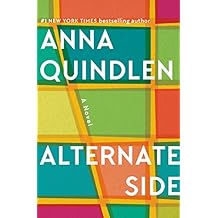 At first I didn't think that I would share my feelings about Ms. Quindlan's latest novel, "Alternate Sides," because I felt the same way as one of the characters in the story who opined that their problems were "first world" troubles. The lyrics to a song kept running through my mind. "Is that all there is?" But it's been a week since I finished this book and its still weighing heavy on my mind.
At first I didn't think that I would share my feelings about Ms. Quindlan's latest novel, "Alternate Sides," because I felt the same way as one of the characters in the story who opined that their problems were "first world" troubles. The lyrics to a song kept running through my mind. "Is that all there is?" But it's been a week since I finished this book and its still weighing heavy on my mind.Anna Quindlan is an author who's always had her finger on the pulse, a chronicler of the zeitgeist. She won a Pulitzer for her musings on daily life in a New York Times column many years ago. But her milieu now may be unfamiliar to many readers, me included, and I almost allowed that to cloud my judgment.
The novel takes place in a small neighborhood of gloriously refinished brownstones in Manhattan. The owners are insular in that they've all known each other, superficially at any rate, for years. They meet annually for a holiday party. They nod and make small talk over their dogs' morning and nightly excursions, and they collude to hire the same nannies and handymen so that there won't be too many unknowns in the their homes or on their street. And, because this is Manhattan, scoring a permanent parking space in the too small empty lot is a sign that one has arrived.
Nora and Charlie are a long-married couple whose kids are away at college, who each have challenging work, and who have become ships passing in the night. Nora is a New Yorker born and bred and thrives on the city. Charlie, not so much. In fact, we gather that he's facing downsizing at the office, and is rattled and unhappy. The city is suddenly his enemy, until he lands a parking spot in the lot down the street.
Now he's part of the club, and the club is agitated by the Hispanic handyman who always seems to squeeze his van in with only an inch to spare, making it difficult for the Volvos and Mercedes to squeak out in the morning. Quindlan subtly creates the tensions that will eventually explode in a horrific act of violence, exposing the cracks that have been slowly developing in the relationships between husband and wife, neighbor and neighbor.
This book, a love song to New York City, would lend itself well to discussion groups as it examines issues of white privilege, ick-inducing expressions of liberal guilt, the fault lines in feminism, and an adeptly handled "me too" moment. As more and more Americans take positions on alternate sides of the status quo, Anna Quindlan uniquely shows us the unintended consequences.

1 comment:
Oh, great! I had just read a review about this book and was enthused, especially since we loved her "take" on South Florida in "The Orchid Thief." so happy you blogged about this book!
Makes me think of old times...
Post a Comment